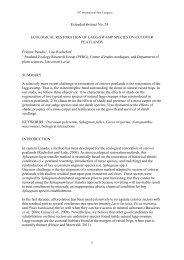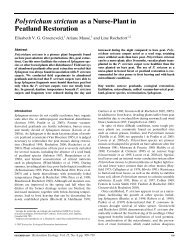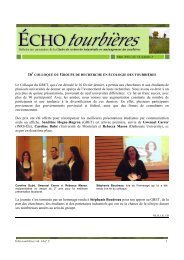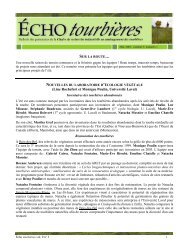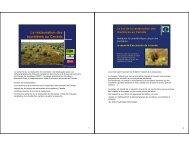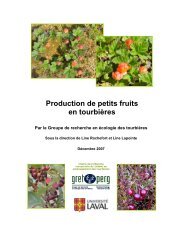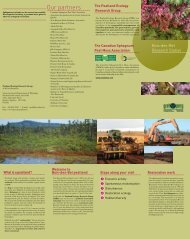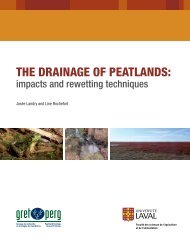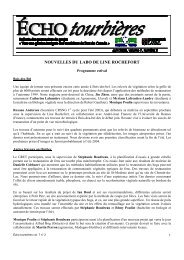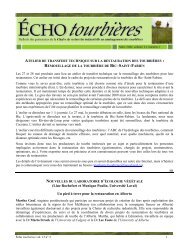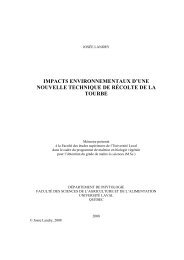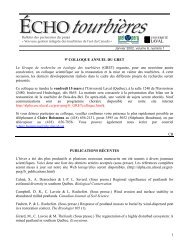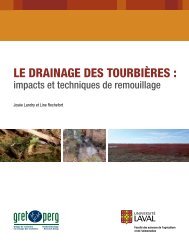wise use of mires and peatlands - Peatland Ecology Research Group
wise use of mires and peatlands - Peatland Ecology Research Group
wise use of mires and peatlands - Peatland Ecology Research Group
Create successful ePaper yourself
Turn your PDF publications into a flip-book with our unique Google optimized e-Paper software.
VALUES AND CONFLICTS: WHERE DIFFERENT VALUES MEET119small compared to the wealth <strong>of</strong> futuregenerations, we may well feel that theythemselves should pay for the problems we haveca<strong>use</strong>d, a situation that we face with respect toproblems that former generations have left tous. Calculating the results <strong>of</strong> a hypotheticaltransfer helps estimate what can be expected fromfuture generations without being unjust(Hampicke 2000).142Cf. Clark 1973.143Cf. Hubbert 1976. Cf. Daly 1990: “Whensomething grows it gets bigger. When somethingdevelops it gets different. The earth ecosystemdevelops (evolves), but does not grow. Itssubsystem, the economy, must eventually stopgrowing, but can continue to develop. The term‘sustainable development’ therefore makes sensefor the economy, but only if it is understood as“development without growth” – i.e. qualitativeimprovement <strong>of</strong> a physical economic base thatis maintained in a steady state by a throughput <strong>of</strong>matter-energy, that is within the regenerative<strong>and</strong> assimilative capacities <strong>of</strong> the ecosystem.Currently the term “sustainable development” is<strong>use</strong>d as a synonym for the oxymoronic“sustainable growth”. It must be saved from thisperdition. … Even “green growth” is notsustainable. There is a limit to the population <strong>of</strong>trees the earth can support, just as there is a limitto the population <strong>of</strong> humans <strong>and</strong> <strong>of</strong> automobiles.To delude ourselves into believing that growth isstill possible <strong>and</strong> desirable if only we label it“sustainable” or colour it “green” will just delaythe inevitable transition <strong>and</strong> make it morepainful.”144As long as there is general growth, there are nolosers: the investor who borrows money does notbecome poorer by paying interest if she investsthe loan in such a way that, allowing for theinterest, she is richer than before. In a societywhich is not physically growing it is impossiblefor everyone to gain by saving at compoundinterest. In those circumstances interest onlyfunctions as a mechanism <strong>of</strong> redistribution: themoney-lender is getting richer, but not society atlarge (Hampicke 2000).145Ott 2000.146Price 1993.147See §3.2.148Even the United Nations General Assemblyadopted a non-anthropocentric approach whenaffirming that “Every form <strong>of</strong> life is unique,warranting respect regardless <strong>of</strong> its worth to man”(World Charter on Nature 1982).149Cf. §3.2.150See also §4.5.151Brennan 1992.152Gorke 1999.153Gorke 1999, 2000154See also §3.2.155See Table 3/1 in §3.2.156A “naturalistic fallacy” means deriving a moralconclusion from a factual premise, i.e. derivingan “ought” statement from what is no more thanan “is” statement. Naturalistic fallacies arecommon in environmental argumentation. Someexamples:● “For 5000 years there was much more forest <strong>and</strong>much less mire. Therefore we have to change<strong>mires</strong> into forests again.” This conclusion wouldonly be valid when combined with a value premise,e.g. “in former times everything was better”.● “This mire contains the only population <strong>of</strong>Aquatic Warbler in the region <strong>and</strong> should thereforebe protected”. This conclusion is only valid whencombined with a value premise like “we mustprotect all species diversity in this region”.157Such an approach could be made operational indaily practice by adapting the (originallybiocentric) principles <strong>of</strong> Paul Taylor’s Respectfor Nature. See also §5.8.



